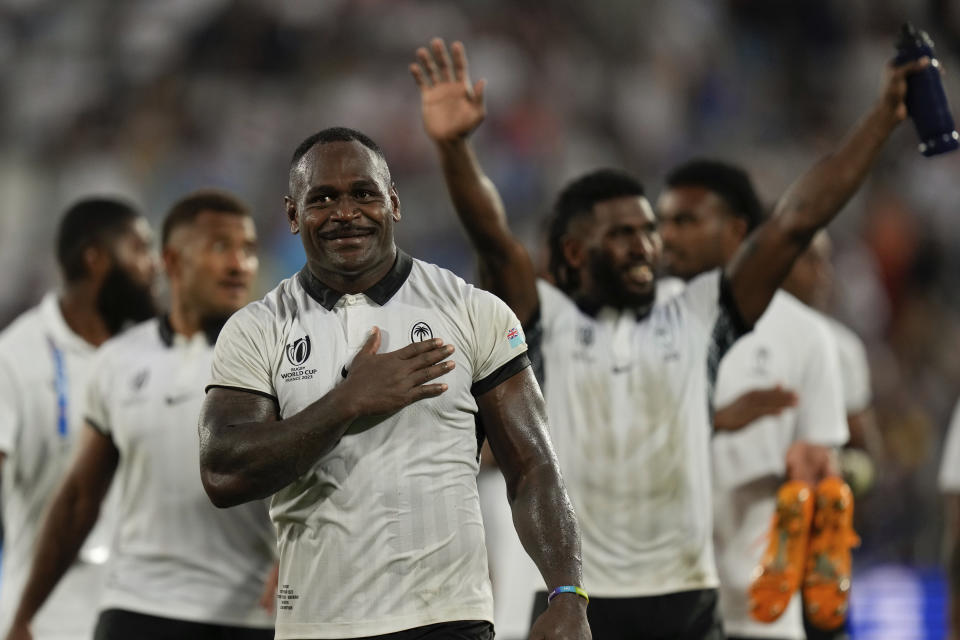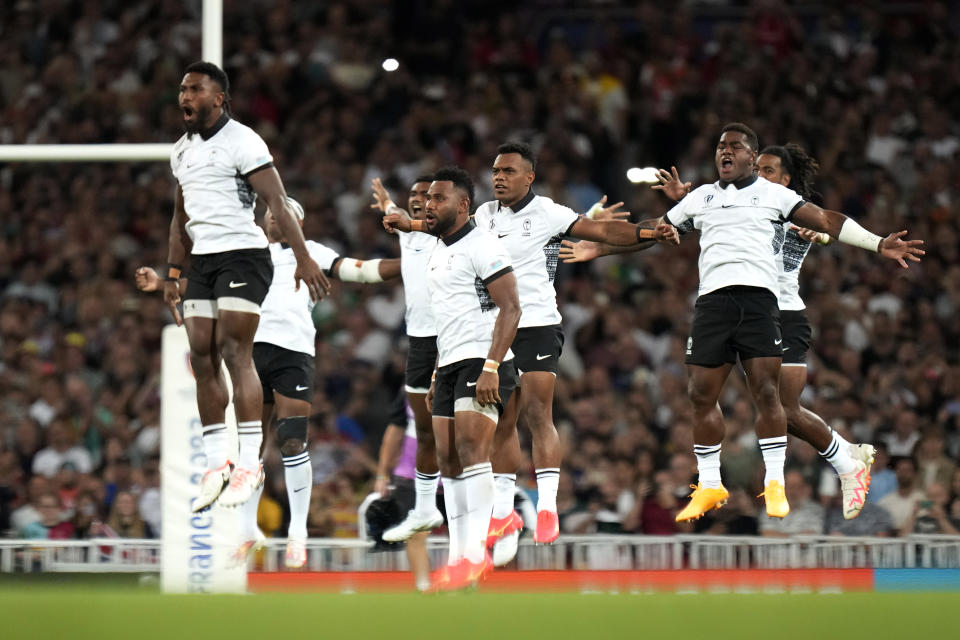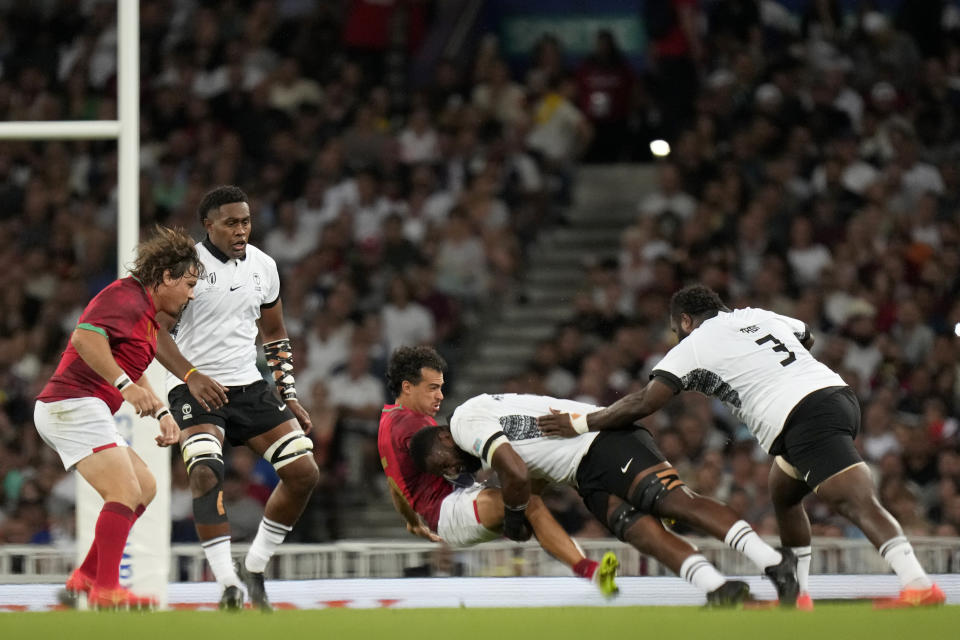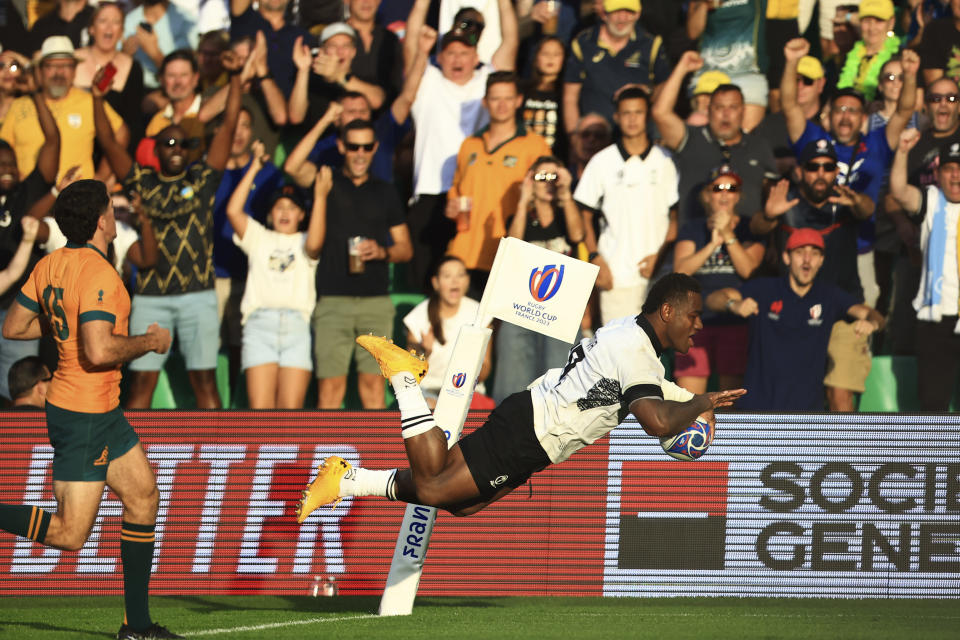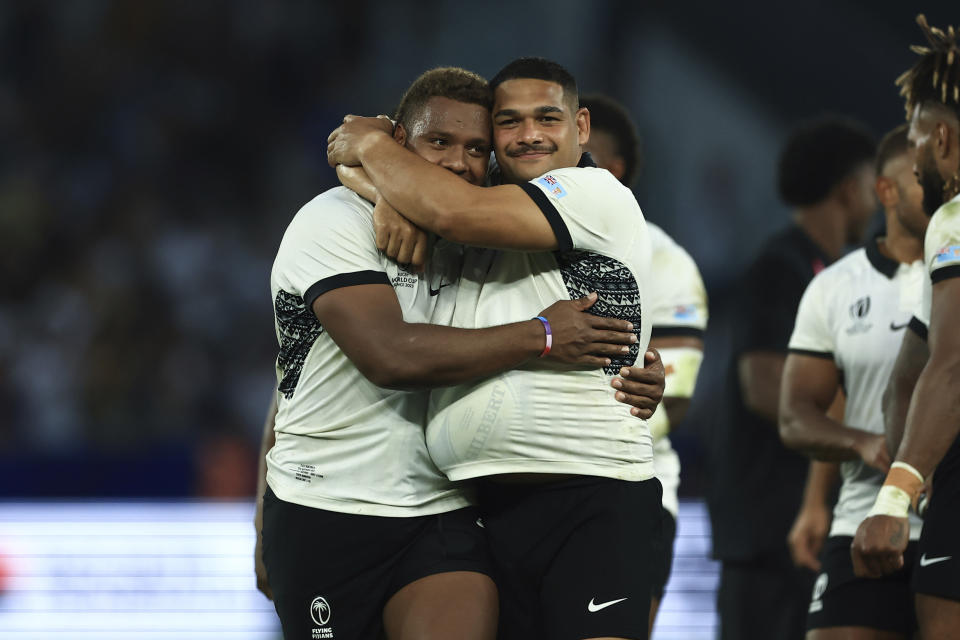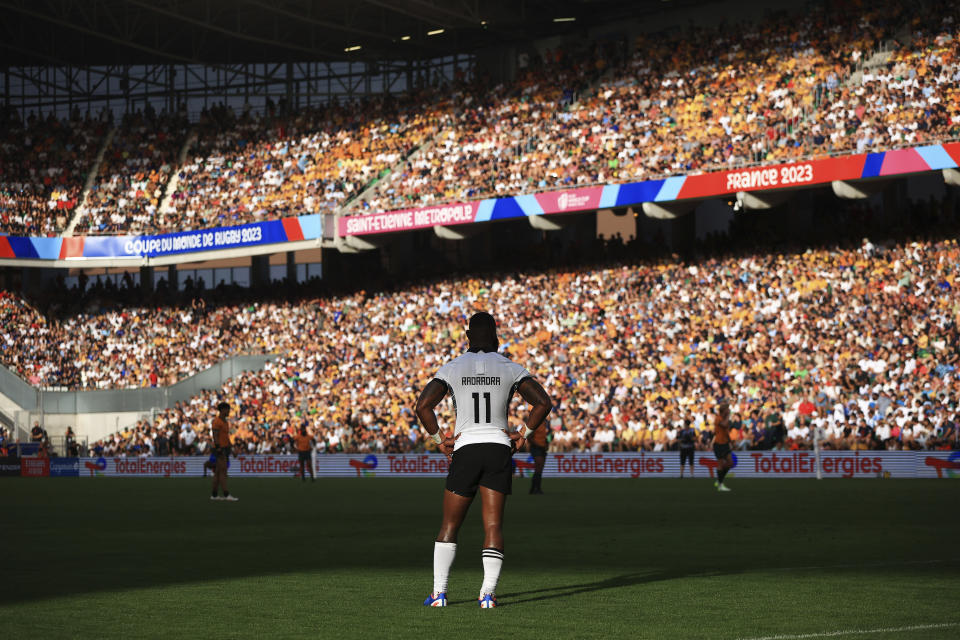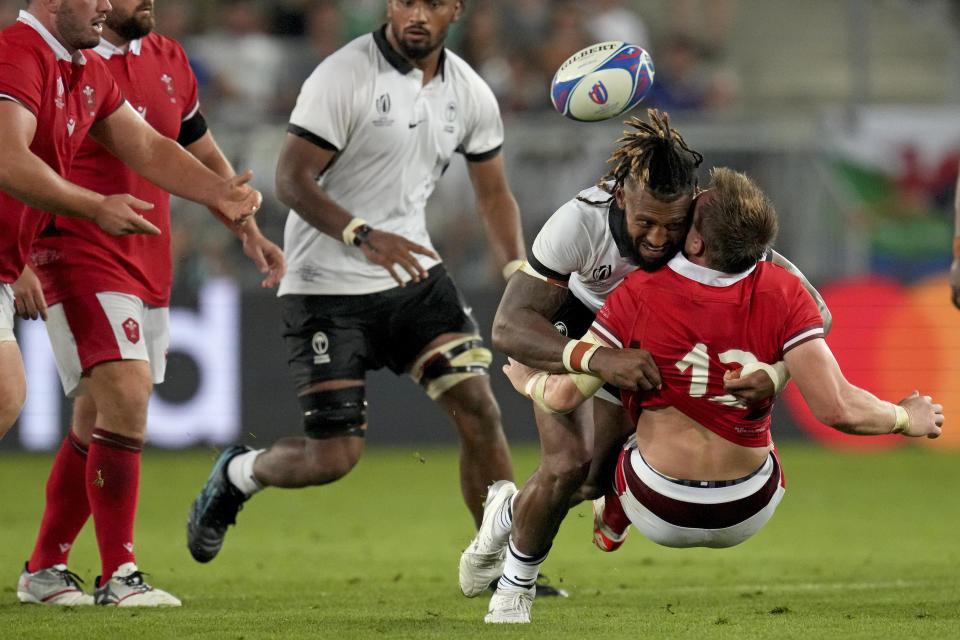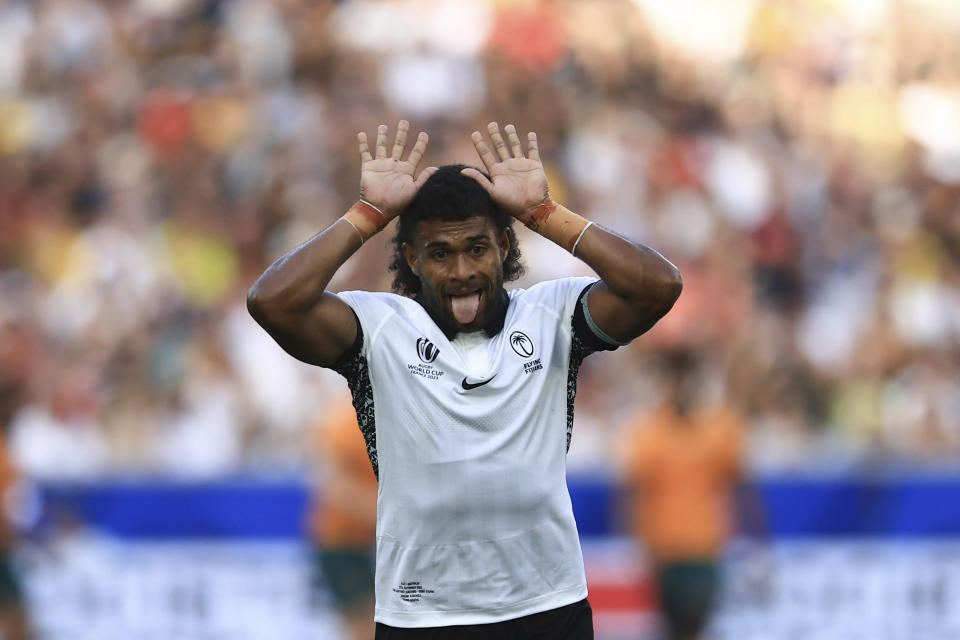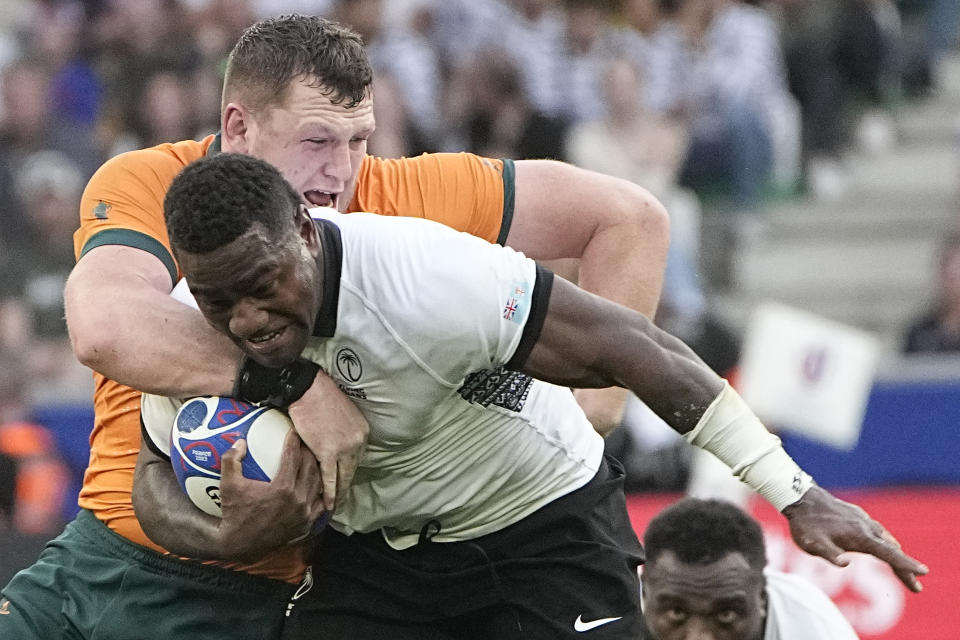Sacrifice and togetherness fuels Fiji's Rugby World Cup run. It has even enchanted King Charles III
- Oops!Something went wrong.Please try again later.
Sacrifice and camaraderie have been the guiding principles for Fiji’s players in their bid to make history at the Rugby World Cup.
They were together, arm in arm, back in July on a rainy and windy afternoon in Sigatoka, a town on the main island of Viti Levu, when they trudged 100 meters up a hill through wet sand early in a grueling World Cup training camp.
They were together when the Flying Fijians — as they are fondly known — marked their arrival in France by gathering on a stage in the center of a town in Bordeaux’s suburbs to sing for the locals and later got in a huddle to sing a hymn, “Au Rai Vei Kemuni,” for King Charles III during the monarch's state visit.
They were together when bouncing back from a cruel opening loss to Wales to beat Australia for the first time in 69 years, underscoring their billing as a potential surprise package at the Rugby World Cup.
And they were together when they helped teammate Josua Tuisova grieve after he was told his 7-year-old son, Tito, died following a long, debilitating illness two weekends ago. Tuisova has stayed with the squad in France, missing Tito's funeral.
"We have all been trying to look after him,” Fiji captain Waisea Nayacalevu said this week of Tuisova. “He has been sad, but he’s really strong. If it was me, I don’t know if I could do what he is doing.
“We keep encouraging him and telling him he’s OK. (Tito) has gone to a better place. He has managed that well and controlled it well, his emotions. I am proud of him and proud of the sacrifice he has made for the team. He has stuck with us.”
This is the close-knit band of brothers England has to get past in the Rugby World Cup quarterfinals in Marseille on Sunday, a stage Fiji has reached for the first time since 2007 — and only the third time ever.
The English are most people's favorites, but they can't underestimate the unity that has been fostered by a Fiji squad that has cast aside its reputation as a gifted but underprepared group to emerge as arguably the story of this Rugby World Cup.
Better known for their outrageous skills and success in sevens, the rugby-obsessed Fijians — like fellow Pacific Island nations Samoa and Tonga — have long had their talent drained by Australia, New Zealand and European countries, and suffered because of a lack of access to lucrative competitions.
That’s largely changed since the inclusion of the Fijian Drua in Super Rugby — the top club competition in the southern hemisphere — from last year, helped by funding from World Rugby. The team supplied 18 of the original squad’s 33 players at this World Cup, bringing a ready-made togetherness to a group that previously seemed undermined by financial issues and poor planning.
“The Drua was brought in to help the younger generations in Fiji, to give them a pathway to the Flying Fijians,” Fiji lock Isoa Nasilasila said, “and it’s good to see that working out.”
The Fijians finally were prepared for a World Cup. They’d had the long training camp where the players were taken back to their roots, like in a trip to the island of Taveuni where they took a boat to the village of Welagi and slept on thin mattresses on the floor of the village hall.
They were battle-hardened through Drua's matches in Super Rugby Pacific and the national team's strong campaign of warmup games that included a first ever win over England at Twickenham and taking France close.
They have a passionate, one-of-their-own coach in Simon Raiwalui, who was promoted from the role of high-performance manager following the resignation of Vern Cotter in February. Raiwalui has brought a pragmatic side to the Fijians that has stood them in good stead at the Rugby World Cup. No longer are they just ad-libbing, crowd-pleasing mavericks with a sevens mentality.
According to World Rugby’s statistics, Fiji averaged the most turnovers won (8) in the pool stage, the second-fewest penalties conceded per game (8.8), and its scrum success (92%) was only just behind England.
They still are bringing the joy, though, averaging the most carries per game (139.5), the second-most offloads (11.3) and third-most meters made (570.5).
It’s the all-round nature of Fiji’s threat that will worry England. Fiji’s players accepted they were gripped with anxiety in the surprise loss to Portugal on Sunday but that didn’t stop them advancing to the last eight, where they are likely to play with more freedom and less pressure.
“I think they need to bring their A game against England,” former Fiji international Niko Matawalu said. “In the warmup before the World Cup, they won all the set-pieces, all the rucks. If they do that again and have accuracy of passes and offloads, if they bring that mindset, they can knock down England.”
Doing that would make for one of rugby’s great stories. Assistant coach Seremaia Bai joked Fiji would probably celebrate with a national holiday a week long.
“Rugby means a lot for us in Fiji, it just gives us life, it keeps everybody happy,” Bai said.
"It keeps the country in unity. Everyone gets up early at three or five o'clock in the morning (to watch the games). The excitement is crazy. People who are sick come alive when we win games.
“Whatever the result, hopefully we will make the country proud. It's not going to be easy, but hey, what a great opportunity for us to come against England.”
Nothing in rugby quite stirs the soul more than the Fijians, the neutral’s favorites, playing with a smile on their faces and a rousing spirit that has been strengthened by the double tragedy that has befallen Tuisova and forward Sam Matavesi.
Matavesi's father, Sireli Matavesi, died this week. The Matavesis are a famous rugby family in Fiji. Sireli played for Fiji Barbarians, and Sam's older brother, Josh, played in the 2015 and 2019 World Cups, so expect the emotions to be high heading into Sunday's game.
“In Fiji, family is everything. This team has become family," Bai said. “If one suffers, we all suffer.”
England has been warned.
___
AP Rugby World Cup: https://apnews.com/hub/rugby
